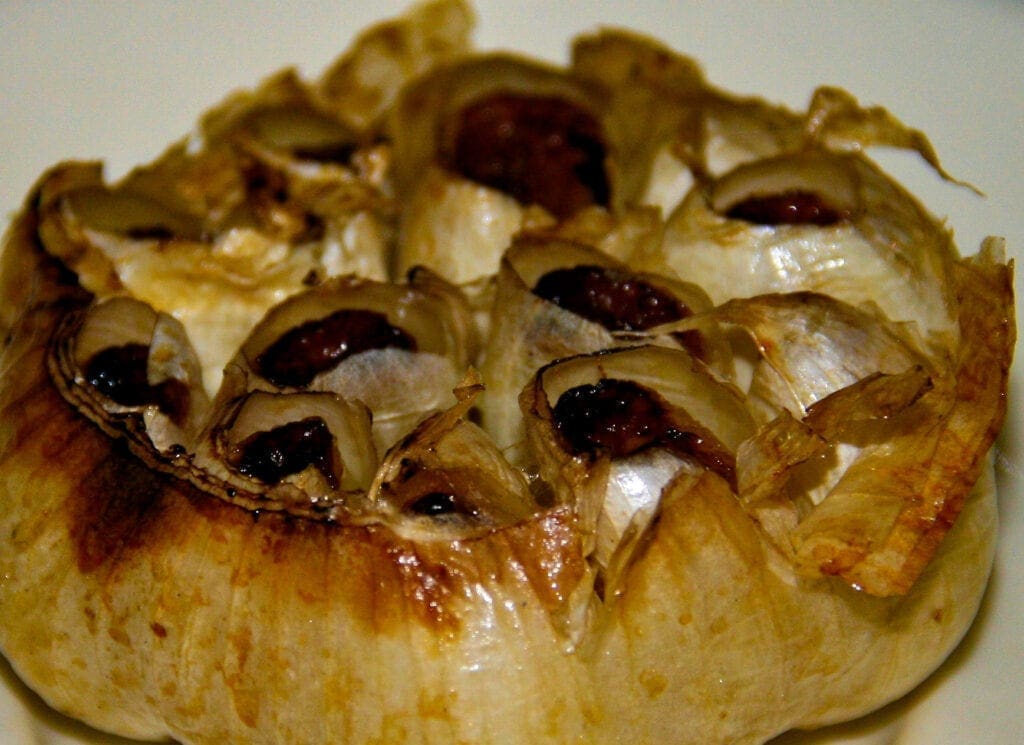“I took it in my hand, tilted the shell back into my mouth as instructed by the now beaming Monsieur Saint-Jour, and with one bite and a slurp, wolfed it down. It tasted of seawater… of brine and flesh… and somehow… of the future. I’d not only survived – I’d enjoyed. This, I knew, was the magic I had until now only dimly and spitefully been aware of. I was hooked.”
~Anthony Bourdain, on eating his first oyster
“Taste it.”
The deep bass voice issued from a lanky, wild-haired farmer, my friend, as he held out a large clove of roast garlic. His hands vaguely dirty in the way a farmer’s always are, the golden clove dripping oil onto his fingers as he offered it to me. Reaching out, I took it from him — inspecting it as it traveled to my lips and smelling its deep, unctuous aroma.
I put the garlic in my mouth, and my world exploded.
Obviously, I’d eaten garlic before. I had even eaten roasted garlic — plenty.
But I had never tasted garlic like this. With a depth of flavor heretofore unexperienced, I tasted the caramelization — brought out by roasting — creating a savory sweetness that undulated like living butter on my tongue.
My eyes widened, and then refocused on my friend. I let out a long, slow expletive, and a smile spread across his face like sunlight breaking through storm clouds. He knew I was starting to get it.

I realized I had not tasted garlic before. I had tasted a pale imitation. What I had previously put into my mouth — into my body — wasn’t garlic. It was packaged; it was from a store. This came from hands, from the earth.
I grew up on a farm, so it’s not like the idea of fresh vegetables and local meat was completely foreign to me. As a kid, however, I wasn’t focused on the quality of food. I just wanted to eat. And like most of us here in Appalachia, I didn’t appreciate the wealth of culture invested in the recipes, nor the sustainability of local agriculture. Food was food. It wasn’t graded, it was consumed.
It wasn’t until that moment, when I really tasted garlic for the first time, that I realized all food was not created equal.
As a barista and cook at a coffee shop in Chicago my understanding of flavor and the experience of tasting further increased.
Our coffee was roasted locally, ground on site, and there was a diversity I couldn’t grasp. I learned about light, medium, and dark roasts; what that meant and why it mattered. Initially, I was blown away by the variety, and I didn’t even understand it. I mean, how many different coffees do you really need? Coffee is coffee, right?
This is the guy talking who in college would make a pot of coffee in the morning and leave it on the hot plate to cook down into tarry sludge. If there was any left when I was done drinking it, I would put the remainder in the fridge to heat up again later. I was the furthest thing from a coffee snob.
But then I started to be able to tell the difference between the roasts.
Every day we ran different dark and light roast coffees. To my surprise, I learned I prefered the light roasts. Those weren’t hard to tell from the dark roasts. Light roast coffees have more nuance as opposed to a dark roast slapping you in the face to make sure you’re awake. Dark roasts are heavy, seemingly thick, and overpowering. Lights roasts not only have more flavor, but theyalso have more caffeine. Double bonus. For my money dark roasts make better espressos, and light roasts are more drinkable in a drip coffee.

Once I started to notice the large differences between light and dark roasts, I noticed I was able to tell the light roasts apart. I learned that I preferred a Guatemalan roast most of all, and after that I liked Costa Rican and Sumatran roasts. If you gave me a cup of coffee, I could accurately identify what bean was used to make it. I was as surprised by this as anyone.
It was as though a veil had been lifted, and I began to see both the variations and grades in all the things I consumed. Not just coffee, but food.
Now, however, I had the scent of something more interesting. There was a length, breadth, and depth I was only starting to grasp and appreciate, and I was experiencing it everywhere. Yes, coffee and food, and also wine, chocolate, beer, cigars, liquor… books, conversations, relationships — anything and everything we consume.
What I learned was a deeper appreciation. Beforehand, I had been sleepwalking through my experiences. I wasn’t cherishing their value. It’s the difference between simply breathing and really getting lost in the scent of freshly baked bread or the smell of summer rain.
Now that’s living.
“I’d learned something. Viscerally, instinctively, spiritually – even in some precursive way, sexually – and there was no turning back. The genie was out of the bottle.”
~Tony again

